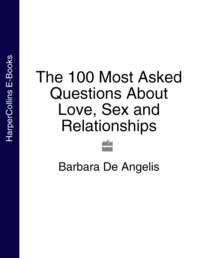
The 100 Most Asked Questions About Love, Sex and Relationships
Remember—in all codependent relationships, the rescuer needs the victim as much as the victim needs the rescuer. If you are an “emotional Robin Hood,” always finding partners in need of your help, you may in fact be completing unfinished business from childhood, acting out your little boy’s unfulfilled need to fix or rescue Mom, Dad, or another family member. Or maybe you’re attempting to rescue yourself as you felt when you were small. The problem is that like all rescuers, you are mistaking sympathy for love.
You already know from experience that this sort of relationship is doomed. You end up acting like a parent, tiptoeing around your partner in order to not upset her, and making excuses for her behavior. Ultimately, your resentment grows and although you want to leave, you feel trapped, too guilty to leave and hurt even more this poor wounded person you wanted to heal. When you do inevitably leave, you feel like you’re abandoning your lover, and beat yourself up for “failing.” Sounds like lots of fun …
You asked me how you could stop. My answer: Just stop. End this relationship before it gets any worse; encourage your girlfriend to get help dealing with her need to be rescued, and take some time to look at your own issues and needs that have addicted you to this kind of unhealthy love pattern. Make a list of all the qualities you want in a woman; make a second list of all the warning signs that someone is a potential “victim-type” mate. Read these lists constantly. Put copies everywhere. When you go out on a date with a new woman, read the lists before, during, and after the date if you have to. This will help you resist the temptation to get involved with another rescue job again while you’re healing on the inside.
22 Can a big age difference between two people hurt the relationship?
I’m in love with a great guy who happens to be twenty-two years older than I am—I’m thirty-one and he’s fifty-three. He’s been married and divorced and has children not much younger than me. My family thinks I’m making a big mistake, and have come right out and told me that they don’t approve of the relationship. Am I being naive to think our age differences don’t matter?


Significant age differences between partners can cause serious problems in relationships. The word “significant” is important here: If your partner is four or five years older or younger, it won’t make much of a difference. However, if your partner is ten or more years older or younger than you, it can cause difficulties depending on your ages and other aspects of your personalities. I’ve found that age differences mean less as both partners get older. For instance, a fifteen-year age difference between a thirty-five-year-old man and a twenty-year-old woman will probably create more potential hazards than that age span in a sixty-fiveyear-old man and a fifty-year-old woman. The age difference will affect the first couple more, since their maturity and experience levels are usually much more dissimilar than the second couple’s.
Here are the most common issues couples face when there is an age difference:
IF YOU ARE THE OLDER PARTNER:
1. You can become impatient with your mate.
If you are significantly older than your mate, you may lose patience with his level of immaturity, lack of life experience, and learning process. This will be especially true if your mate is between twenty and thirty years of age. After all, you’ve already gone through a lot of what she’s dealing with; you’ve realized it’s not the end of the world when you go through a crisis, because it always works out in the end; you’ve made mistakes and figured out how to do things the right way. So it’s not easy watching your younger partner stumble through these same life experiences.
2. You have a tendency to act like a parent to your mate.
When you have ten, twenty, or thirty more years of life experience than your partner has, you will find it next to impossible not to offer advice, correct, and direct him or her. After all, you’ve been through this before—you know the best way to do it. Of course your intentions are loving; you’re only trying to help. But the effect can be very destructive to your relationship. YOU BEGIN ACTING LIKE A PARENT AND TREATING YOUR PARTNER LIKE A CHILD. Naturally, your mate feels as if you don’t trust her, you don’t respect her, and responds just like a rebellious teenager would—she becomes resentful and pulls away. And this parent-child game will quickly destroy the passion in your sex life, since your relationship starts taking on incestuous overtones.
3. You may be much more financially successful than your partner.
Конец ознакомительного фрагмента.
Текст предоставлен ООО «ЛитРес».
Прочитайте эту книгу целиком, купив полную легальную версию на ЛитРес.
Безопасно оплатить книгу можно банковской картой Visa, MasterCard, Maestro, со счета мобильного телефона, с платежного терминала, в салоне МТС или Связной, через PayPal, WebMoney, Яндекс.Деньги, QIWI Кошелек, бонусными картами или другим удобным Вам способом.
Вы ознакомились с фрагментом книги.
Для бесплатного чтения открыта только часть текста.
Приобретайте полный текст книги у нашего партнера:
Всего 10 форматов